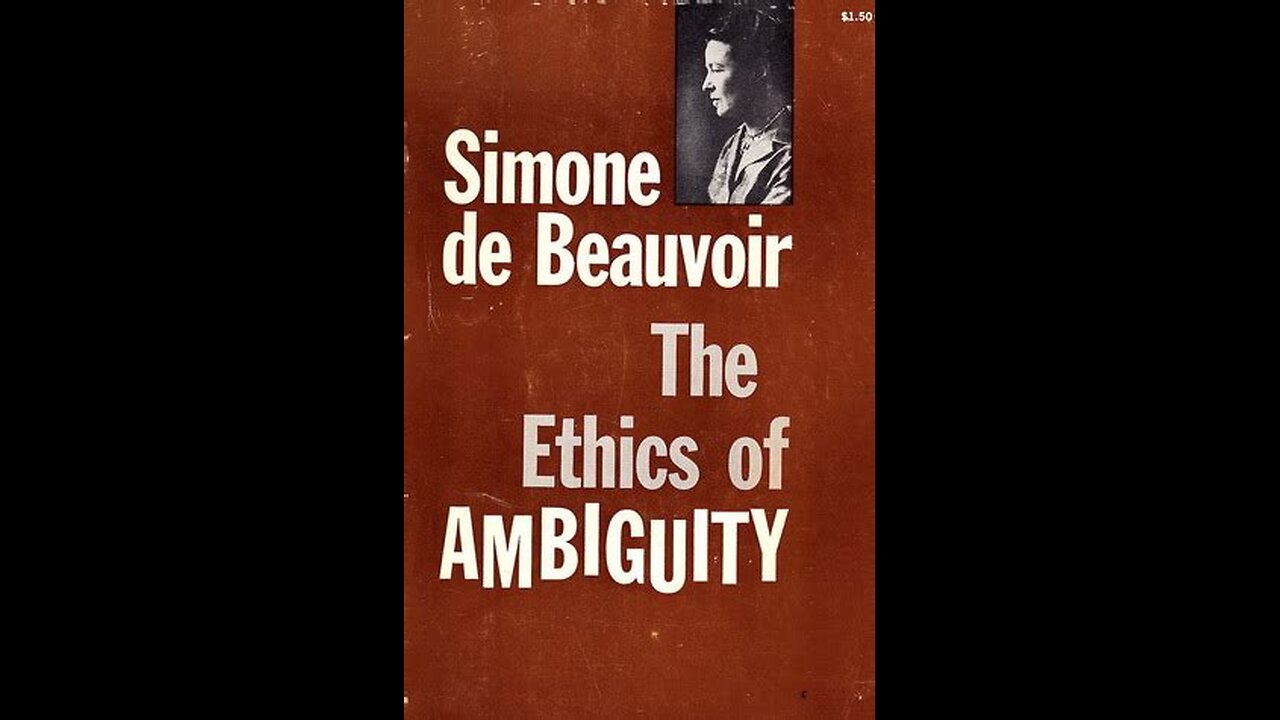Premium Only Content

The Ethics of Ambiguity by Simone de Beauvoir | Summary and Critique
Buy Here: https://amzn.to/4fOcLHK
"""The Ethics of Ambiguity"" is a philosophical work written by Simone de Beauvoir, a prominent existentialist philosopher and feminist thinker, in 1947. The book explores existentialist ethics and the concept of freedom, focusing on the inherent ambiguity and responsibility of human existence.
In ""The Ethics of Ambiguity,"" Beauvoir argues that human existence is characterized by ambiguity, meaning that individuals are both free and constrained by various factors such as social structures, history, and physicality. She contends that acknowledging and embracing this ambiguity is essential for authentic human existence.
Beauvoir emphasizes the importance of individual freedom and personal responsibility. She rejects the idea of predetermined essences or fixed human nature, asserting that individuals are constantly in the process of becoming and defining themselves through their choices and actions. She argues that true freedom lies in the recognition of one's freedom and the responsibility that comes with it.
The book explores various aspects of human existence, including relationships, morality, and social institutions. Beauvoir argues that genuine ethical action requires acknowledging the freedom and agency of others and treating them as subjects rather than objects. She critiques oppressive systems and calls for the dismantling of patriarchal structures that restrict the freedom and autonomy of women.
Beauvoir also delves into the concept of ""bad faith,"" which refers to individuals denying their freedom and assuming fixed roles or identities imposed upon them by society. She emphasizes the need for individuals to confront and transcend such self-deception in order to live authentically and ethically.
Critique of ""The Ethics of Ambiguity"" includes the following points:
1. Ambiguity as a Source of Possibility: While Beauvoir celebrates the inherent ambiguity of human existence, some critics argue that the book does not fully explore the positive potential of ambiguity. They contend that the focus on ambiguity as a source of limitation and responsibility may overshadow its creative and liberating aspects.
2. Individualism and Interdependence: Beauvoir's emphasis on individual freedom and responsibility has been criticized for neglecting the importance of social and collective dimensions of ethical action. Critics argue that the book's individualistic approach may downplay the interconnectedness and interdependence of individuals in ethical decision-making.
3. Limited Engagement with Intersectionality: While Beauvoir addresses issues of gender and women's liberation, some critics argue that her analysis is not fully intersectional, as it does not adequately consider how multiple forms of oppression, such as race and class, intersect and influence individuals' experiences of ambiguity and freedom.
4. Lack of Concrete Guidance: Some readers find Beauvoir's existentialist ethics lacking in providing practical guidance for moral decision-making in specific situations. The emphasis on personal responsibility and individual freedom may leave readers seeking more explicit guidelines for ethical action.
Despite these critiques, ""The Ethics of Ambiguity"" remains a significant contribution to existentialist philosophy and feminist thought. Its exploration of human freedom, responsibility, and the complexities of existence continues to resonate and inspire discussions on ethics, feminism, and the nature of human agency."
-
 DVR
DVR
vivafrei
6 hours agoKash Patel Confirmation Hearing LIVE! Jan. 6'er Kicked Out of CPAC? DOGE Wins in Court? & MORE!
198K130 -
 LIVE
LIVE
Barry Cunningham
6 hours agoTRUMP DAILY BRIEFING: KASH PATEL VOTE | WHITE HOUSE PRESS CONFERENCE | DOGE UPDATE
1,159 watching -
 1:57:54
1:57:54
The Quartering
4 hours agoRand Paul Praises Trump, Amazon Takes Control of Bond, and Delta Gives Passengers $30,000
54.8K18 -
 1:01:59
1:01:59
The White House
3 hours agoPress Secretary Karoline Leavitt Briefs Members of the Media, Feb. 20, 2025
51.2K30 -
 59:58
59:58
Russell Brand
5 hours agoLive from Mar-a-Lago: The Globalist Empire’s Last Stand – SF541
117K87 -
 35:23
35:23
CryptoWendyO
2 hours ago $1.35 earnedCrypto Chaos Unleashed: Trump Making USA The Bitcoin Capital Of The World
17K2 -
 1:03:00
1:03:00
The Dan Bongino Show
6 hours agoTrump Keeps Delivering And The Libs Are Seething (Ep. 2427) - 02/20/2025
745K1.68K -
 1:20:26
1:20:26
Nerdrotic
4 hours ago $4.43 earnedSuper Chat Square Up - Nerdrotic Nooner 466
66.9K2 -
 2:05:00
2:05:00
Steven Crowder
7 hours agoTrump Slams Dictator Zelensky: Why He NOW Has a Point
476K301 -
 2:58:22
2:58:22
LFA TV
19 hours agoKASH CONFIRMATION & PRESS BRIEFING! | LIVE FROM AMERICA 2.20.25 11AM
114K51